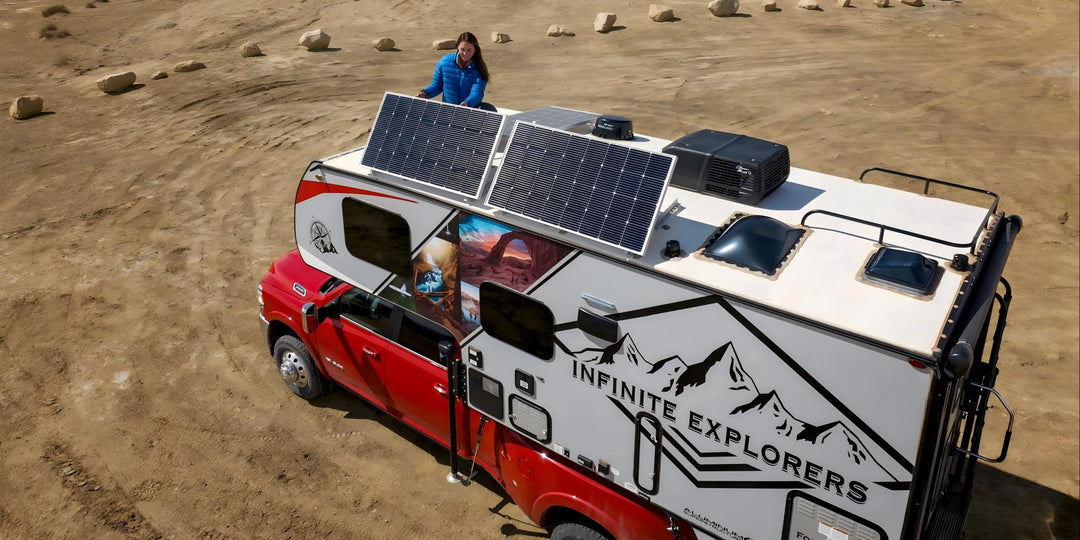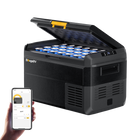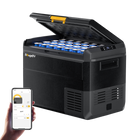Do Solar Panels Need Direct Sunlight?

When it comes to solar panels, one of the most common questions people often ask is: "Do solar panels need direct sunlight to work?" Whether you’re powering your RV, charging devices, or running small appliances, understanding whether solar panels require direct sunlight and how they perform under varying weather conditions is key to maximizing your investment.
At BougeRV, we specialize in portable and efficient solar panels designed for outdoor use. In this blog post, we’ll answer the big question about whether solar panels need direct sunlight and explore how weather impacts solar energy production.
Do Solar Panels Need Direct Sunlight?
The short answer is: No, solar panels don’t necessarily need direct sunlight to work. However, direct sunlight does help them generate electricity more efficiently. Solar panels are designed to capture sunlight and convert it into electricity by photovoltaic (PV) cells. Even when it’s cloudy or overcast, solar panels can still absorb sunlight, though their efficiency may be reduced.
Here’s how it works:
Direct sunlight: When the sun is shining brightly and directly onto your solar panels, they operate at their highest efficiency. This is the ideal condition for generating maximum power.
Diffuse sunlight: On cloudy days, sunlight is scattered by clouds and doesn’t hit the panels directly. While the energy output will be lower compared to a sunny day, modern solar panels are still able to capture this scattered light and produce electricity.
Shade: Partial shading (like from trees or buildings) can reduce the efficiency of your solar panels. However, some advanced solar panels, including those offered by BougeRV, are designed to minimize the impact of shading.
In short, while direct sunlight is optimal, your solar panels will still work under less-than-perfect conditions. This makes them a reliable energy source for campers who might encounter a variety of weather conditions.
How Weather Affects Solar Panel Performance

When you’re out camping, you can’t control the weather. However, the good news is that solar panels are highly versatile and can handle a wide range of environments. Let’s break down how various weather conditions can impact solar energy production and explore the role of direct sunlight in each scenario.
Sunny Days
This is the best-case scenario for solar panels. On a clear, sunny day, your panels will operate at peak efficiency, generating the maximum amount of electricity. For campers, this means you can power up your devices, charge batteries, and run small appliances with ease. Direct sunlight is key to achieving this level of performance.
Cloudy or Overcast Days
On cloudy days, solar panels typically generate around 10-25% of their maximum capacity, depending on the density of the cloud cover. While this may not be sufficient to power energy-intensive appliances, it’s often enough to charge smaller devices such as phones or portable power stations. BougeRV solar panels are engineered to perform efficiently even in low-light conditions, demonstrating that direct sunlight isn’t always a necessity for reliable energy production.
Rainy Weather
Rain doesn’t damage solar panels; in fact, it can help wash away dirt and debris, enhancing their efficiency when the sun reappears. Although energy production decreases during rain, your panels will still generate some electricity. Additionally, our portable solar panels are designed to be weather-resistant, ensuring durability even during heavy downpours. Whether it’s rainy or sunny, the question of whether solar panels need direct sunlight is more about optimizing efficiency rather than compromising functionality.
Cold Weather
Contrary to popular belief, solar panels perform better in cooler temperatures. Heat can reduce the efficiency of solar cells, so cold, sunny days are ideal for energy production. If you’re camping in the fall or winter, you can count on your solar panels to deliver reliable power. And yes, direct sunlight is still a bonus in these conditions.
Snow
Snow can temporarily reduce energy production if it covers your solar panels. However, most panels are designed with a slick surface that allows snow to slide off easily. Additionally, the reflection of sunlight off the snow can enhance energy production once the panels are clear. Even in snowy conditions, the question of whether solar panels need direct sunlight becomes less about limitations and more about maximizing energy.
Tips for Maximizing Solar Panel Performance While Camping
To get the most out of your solar panels during your camping trips, keep these tips in mind:
Position Your Panels Correctly: Find a place where the panels can receive the most sunlight. If possible, angle them towards the sun to maximize energy absorption.
Keep Them Clean: Dust, dirt, and debris can reduce the efficiency of your panels. Wipe them down regularly with a soft cloth to ensure they’re operating at their best.
Monitor the Weather: Check the weather forecast before starting your trip. On cloudy days, prioritize charging essential devices to conserve energy.
Use a Power Station: Pair your solar panels with a portable power station to store energy for later use. This is especially useful for nighttime or cloudy conditions when energy production is lower.
Conclusion
Do solar panels need direct sunlight? While direct sunlight is ideal, it’s not a strict requirement. Modern solar panels, such as those offered by BougeRV, are capable of generating electricity even in cloudy or less-than-perfect conditions. For campers and outdoor enthusiasts, this means you can rely on solar power as a versatile and eco-friendly energy source, no matter the weather.
Whether you’re planning a weekend getaway or a cross-country road trip, BougeRV solar panels are here to keep you powered up and ready for adventure. If you’ve been considering switching to solar for your RV, cabin, or off-grid adventures, now’s the perfect time. BougeRV solar panels are designed for maximum efficiency and long-lasting performance—and you can save even more with code SPNARY07 for an extra 7% off your order.
FAQs
1. Do Solar Panels Work at Night?
Solar panels do not generate electricity at night since they rely on sunlight to produce energy. However, you can store the energy collected during the day in a portable power station or battery. By pairing your BougeRV solar panels with a compatible power station, you can easily access stored energy to charge your devices or power appliances after the sun goes down.
2. How Do I Maintain My Solar Panels While Camping?
Maintaining your solar panels is simple and ensures they perform at their best:
Clean them regularly: Use a soft cloth or sponge to remove dirt, dust, or debris. Avoid abrasive materials to prevent scratches.
Protect them during transport: Store your panels in their protective case (if provided) or wrap them in soft material to avoid damage while traveling.
Inspect for damage: Before and after each trip, check for cracks or other signs of wear. BougeRV panels are built to be durable, but regular inspections help extend their lifespan.
3. What Size Solar Panel Do I Need for Camping?
The size of the solar panel you need depends on your energy requirements:
- For charging small devices such as phones, cameras, or LED lights, a 100W panel is usually sufficient.
- For powering larger devices or multiple appliances, consider a 200W panel or higher.
If you’re unsure, BougeRV offers a variety of solar panels with different wattages. Pairing them with a portable power station ensures you have enough energy for all your needs.

























































































































































































